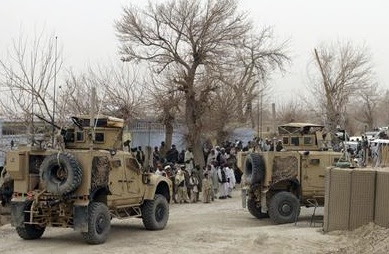 |
| U.S. armoured vehicles are parked outside a U.S. base in Panjwai district Kandahar |
(Reuters) - U.S. authorities have given cash compensation to the families of Afghans killed in a shooting rampage allegedly carried out by an American soldier in Kandahar province, a family member and a tribal elder said on Sunday.
The families received around $50,000 for each person killed and about $10,000 for each wounded in the shootings in two villages in Panjwai district earlier this month. Afghan officials say 16 people, including nine children and women, were killed in the attacks.
"We were invited by the foreign and Afghan officials in Panjwai yesterday and they said this money is an assistance from Obama," Haji Jan Agha, who said he lost his cousins, told Reuters, referring to U.S. President Barack Obama.
The U.S. embassy directed all questions to the NATO-led International Security Assistance Force (ISAF) which is fighting the war in Afghanistan.
An ISAF spokesman said he was in not in a position to either confirm or deny whether compensation was given, and if so how much.
Lieutenant Commander Brian Badura said that as a matter of policy ISAF does not make restitution for losses resulting from combat, combat-related activities or operational necessity.
"Individual troop contributing nations may participate in some form of restitution consistent with the cultural norms of Afghanistan," he said. "Settlement can come in a number of forms which may (be) but is not always financial."
"As a settlement of claims in most cases is a sensitive topic for those who have suffered loss it is usually a matter of agreement that terms of settlement remain confidential."
On Friday, U.S. authorities investigating the killings charged Staff Sergeant Robert Bales with 17 counts of premeditated murder. Initial reports from Afghanistan put the death toll at 16 people, and it was not immediately clear where the extra count came from.
The killings have further damaged U.S.-Afghan relations that were already under severe strain, and come at a time when foreign forces are preparing to hand over security responsibilities to Afghan forces ahead of a planned withdrawal by the end of 2014.
"The Americans came to Panjwai and handed over compensation to the families," said Haji Agha Lalai, an influential tribal elder and member of the provincial council.
The families received around $50,000 for each person killed and about $10,000 for each wounded in the shootings in two villages in Panjwai district earlier this month. Afghan officials say 16 people, including nine children and women, were killed in the attacks.
"We were invited by the foreign and Afghan officials in Panjwai yesterday and they said this money is an assistance from Obama," Haji Jan Agha, who said he lost his cousins, told Reuters, referring to U.S. President Barack Obama.
The U.S. embassy directed all questions to the NATO-led International Security Assistance Force (ISAF) which is fighting the war in Afghanistan.
An ISAF spokesman said he was in not in a position to either confirm or deny whether compensation was given, and if so how much.
Lieutenant Commander Brian Badura said that as a matter of policy ISAF does not make restitution for losses resulting from combat, combat-related activities or operational necessity.
"Individual troop contributing nations may participate in some form of restitution consistent with the cultural norms of Afghanistan," he said. "Settlement can come in a number of forms which may (be) but is not always financial."
"As a settlement of claims in most cases is a sensitive topic for those who have suffered loss it is usually a matter of agreement that terms of settlement remain confidential."
On Friday, U.S. authorities investigating the killings charged Staff Sergeant Robert Bales with 17 counts of premeditated murder. Initial reports from Afghanistan put the death toll at 16 people, and it was not immediately clear where the extra count came from.
The killings have further damaged U.S.-Afghan relations that were already under severe strain, and come at a time when foreign forces are preparing to hand over security responsibilities to Afghan forces ahead of a planned withdrawal by the end of 2014.
"The Americans came to Panjwai and handed over compensation to the families," said Haji Agha Lalai, an influential tribal elder and member of the provincial council.
